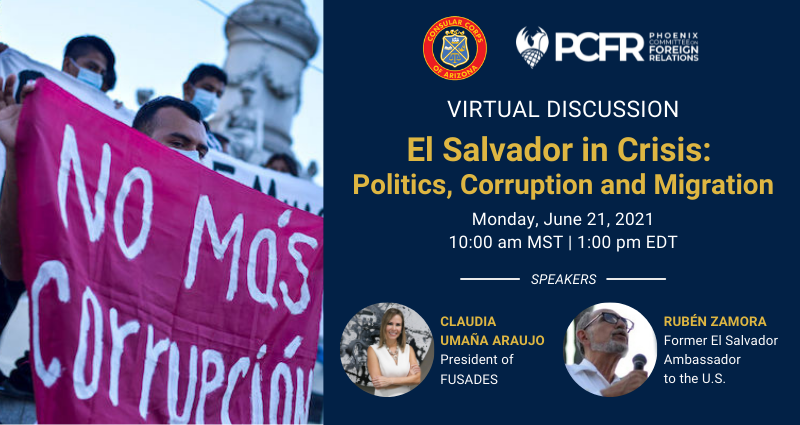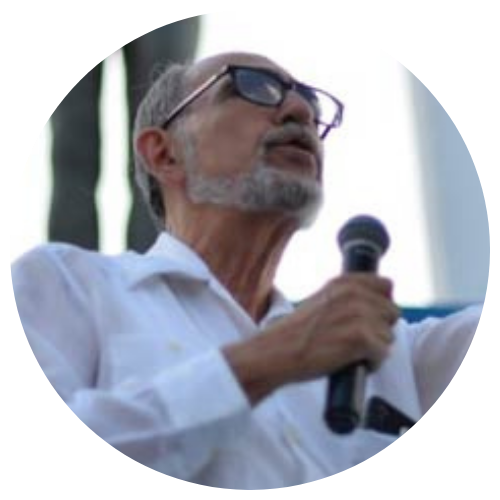
El Salvador in Crisis: Politics, Corruption and Migration
El Salvador is at a crossroads. The country looks to become the world’s first country to adopt bitcoin as legal tender. El Salvador's young President Nayib Bukele is increasingly seen as an authoritarian leader. This is all in the midst of a migration crisis in Central America and at the U.S. border.
Please join PCFR and the Consular Corps of Arizona for a program with former El Salvador Ambassador to the U.S., Rubén Zamora and Claudia Umaña Araujo, President of FUSADES for a timely discussion on El Salvador.
Registration
FREE for PCFR Members
$10 for Non-Members
Schedule
Monday, June 21, 2021
10:00 am-11:00 am MST
1:00 pm-2:00 pm EDT
Venue
Zoom Meeting
The link for this webinar will be included in your registration confirmation email.
Speakers
Claudia Umaña Araujo
President of FUSADES
 Claudia Umaña Araujo is a lawyer, activist and legal researcher born in San Salvador, El Salvador. While studying for her law degree from the University Dr. Jose Matías Delgado, the country went through one of its most convulsive times. These circumstances had a great impact on her life and is what has led her to devote most of her career to the pursuit of modernization of the State, search of opportunities through trade and the promotion of the importance of transparency and rule of law as the path to prosperity and peace.
Claudia Umaña Araujo is a lawyer, activist and legal researcher born in San Salvador, El Salvador. While studying for her law degree from the University Dr. Jose Matías Delgado, the country went through one of its most convulsive times. These circumstances had a great impact on her life and is what has led her to devote most of her career to the pursuit of modernization of the State, search of opportunities through trade and the promotion of the importance of transparency and rule of law as the path to prosperity and peace.
She is the first woman President of FUSADES, which has been ranked among the top 12 in Latin America according the “Think Tank Initiative.” She was the founder and former President for 10 years of the NGO: Democracy - Transparency - Justice (DTJ), which promotes transparency, women’s rights and rule of law. Claudia was also a public servant for almost a decade working as the Director of Trade/Commercial Policy of the Ministry of Economy of El Salvador, with the rank of Special Ambassador for Trade Negotiations. During the years that she held office she coordinated the team that negotiated the WTO agreements, CAFTA-DR, Central America and Chile FTA, among other trade treaties. She was also the head of the Central American Economic Integration process. In 2014, she was awarded the "Order of Bernardo O'Higgins" in rank of Officer, by the Government of Chile and in June 2018. Claudia is one of the 12 Salvadoran leaders that are members of the Central American Prosperity Project which is a program to develop action-oriented strategies for achieving inclusive growth in the Northern Triangle, launched in 2018 by the George W. Bush Institute. In 2020, in honor of International Women’s Day, the Bush Institute experts recognized her as a trailblazing woman in their leadership programs. Claudia is a Fellow of the sixth class of the Central America Leadership Initiative (CALI) and a member of the Aspen Global Leadership Network.
Amb. Rubén Zamora
Former El Salvador Ambassador to the U.S.
 Rubén Zamora presented his credentials as El Salvador’s ambassador to the United States to President Barack Obama on April 15, 2013. For Zamora, the moment may have seemed ironic; 30 years earlier, he was prohibited from even entering the country.
Rubén Zamora presented his credentials as El Salvador’s ambassador to the United States to President Barack Obama on April 15, 2013. For Zamora, the moment may have seemed ironic; 30 years earlier, he was prohibited from even entering the country.
Zamora was born November 9, 1942, in San Salvador, the capital of El Salvador. He was in seminary for a while, but studied law at the University of El Salvador and later received a Master’s degree in political science from the University of Essex in England.
In the early 1970s, he was a member of the San Salvador council, working the mayor’s office. In 1979, after a coup toppled a right-wing president, Zamora, as a member of a center-left group, was briefly part of the group that assumed power. However, right-wing factions took control of the government in early 1980, forcing out Zamora and assassinating his brother Mario, who was also in the government. Rubén Zamora then fled El Salvador, staying in exile for seven years.
During his time out of the country, spent in Nicaragua and Mexico, Zamora was often a spokesman for the rebels fighting for control of El Salvador, whose government was backed by U.S. President Ronald Reagan. Zamora was blocked by the Reagan State Department from entering the United States during this period.
When finally peace talks resulted in an amnesty in 1987, Zamora returned to El Salvador, wearing a bulletproof vest. In 1989, his house was bombed, but no one was hurt.
In 1991, peace talks resumed and a truce was declared. Zamora won a seat in the national assembly and was named one of its vice presidents, posts he held until 1994. He was also a member of the Salvadoran peace commission. Zamora ran for president in 1994, the first election since the peace accords were signed. He was backed by the center-left CD-FMLN coalition. He lost to Armando Calderon Sol of the right-leaning ARENA party. Zamora ran unsuccessfully for president again in 1999.
For the next 10 years, Zamora worked in the opposition to the government, getting local candidates elected and taking his case to lecture audiences abroad. In 2009, FMLN candidate Mauricio Funes was elected president. Zamora was named ambassador to India, where he remained until being named to the Washington post in 2013.
Zamora and his wife Ester have five children.
